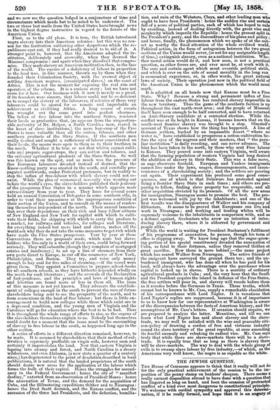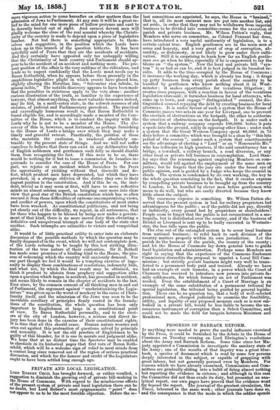THE JEWISH QUESTION.
TIM House of Commons appears to think that it really will not do for the only practical achievement of the session to be the im- position of the penny stamp on bankers' cheques. There seems a really earnest disposition abroad to have done with a question that has lingered so long on hand, and been the occasion of protracted conflict of a kind ever most dangerous to constitutional prinoiliF• We welcome with cordial sympathy and approval this determi- nation, if it be really formed, and hope that it is au augury, of more vigorous action to come hereafter on other matters than the admission of Jews to Parliament. At any rate it will be a great re- lief to the mind for one more piece of hollow pretence and cant to be decently buried out of sight. And earnest devout men will gladly welcome the close of the real scandal whereby the Christi- anity of the country is made to depend upon a piece of legislative lumber. Not but there is something appropriate to them- selves and suggestive, in the position which the Lords have taken up in this branch of the question hitherto. It has been spitefully said of Peers that they are the accidents of accidents. And they certainly have appeared only too unhappily willing that the Christianity of both country and Parliament should ap- pear to be the accident of an accident and nothing more. The pre- sent position of the affair is the very sublime of the ridiculous, and leads us to expect confidently that the Lords must needs say to Baron Rothschild, when he appears before them presently in the amphibious legislative plight in which events have placed him, slightly altering the Horatian line, " Solvuntur risu tabulw, to missus inibis." The notable discovery appears to have been made that the penalties in strictness apply to the vote alone : another curious illustration of the truth, so familiar to the experience of lawyers, that almost anything, the most valuable treasures indeed, may he hid, in a moth-eaten state, in the cobweb recesses of old statutes, of judicial and Parliamentary precedent. The practical and exceedingly humorous result is, that Baron Rothschild is found eligible for, and is accordingly made a member of the Com- mittee of the House, which is to conduct the inquiry with the Lords why he is not to be a member of the House. The dis- covery of this is, however, most fortunate as perhaps furnishing to the House of Lords a bridge over which they may make a timely and graceful retreat. Practically, the position of those who maintain the exclusion, is rendered absolutely un- tenable by the present state of things. And we will not suffer __ourselves to believe-that there can exist in any deliberative body of English noblemen and gentlemen such folly as should disable them from recognizing the fact. If this were to be so, there would be nothing for it but to issue a commission de lunatico in- quirendo to consider the case of the House of Peers. For our part, we rejoice at an incident which furnishes to the Peers the opportunity of yielding without that discredit and de- feat, which prudent men have deprecated, but which they have provoked, in a strange oblivion of the duties they owe to their august position in the constitution. And if this be so, the inci- dent, trivial as it may seem at first, will have to more reflective minds an almost solemn aspect, as bringing once more into clear view that good star of the British constitution which has so often rescued it from those difficulties of extreme uncompromising views, and conflict of powers, upon which the constitutions of most states have been wrecked. As constitutional politicians, and not being yet dearly out of the difficulty, we repeat, in all seriousness, that for those who happen to be blessed by being now under a govern- ment of that kind, there is no more sacred duty than obviating a definitive and unequivocal triumph of one body of the state over another. Such triumphs are calamities to victors and vanquished. alike.
It would be of little practical utility to enter into an elaborate discussion of the possible methods by which the question may be finally disposed of in the event, which we will not contemplate now, of the Lords refusing to be taught by this last striking illus- tration of the true nature of their contention. Sir R. Bethell has made some promises of a binding kind to the House, the pro- cess of redeeming which the country will anxiously demand. For our part though we feel it would be a tempting exercise of inge- nuity to display those combinations of resolutions, indemnity bills, and what not, by which the final result may be obtained, we think it prudent to abstain from prophecy and suggestion alike upon a question which began in accident, has proceeded in accident, and seems likely to remain in the chapter of accidents to the last. Ever since, by the common consent of all thinking men in and out of Parliament, the argument against " unchristianizing the Legis- lature" was given up as the worst of mockery to the cause of Chris- tianity itself, and the admission of the Jews was seen to be the inevitable corollary of principles firmly rooted in the founda- tions of the constitution, the whole question has been only important to Englishmen at large in a constitutional point of view. To Baron Rothschild personally, and to the elect- ors of the city of London, however, a serious and direct in- jury has been done in the exercise of their constitutional rights. It is time that all this should cease. Human nature wearies and cries out against this protraction of questions solved by principle and necessity. It is not the old practice of Englishmen to be lty of this blunder, for it is one in morals and judgment alike. e hope that at no distant time the Spectator may be enabled to chronicle in its historical pages that first vote of Baron Roth- schild, which will be a welcome sign of relief to most minds from a contest long since removed out of the region of serious practical discussion, and which for the honour and credit of the Legislature ought to have been settled long enough ago.































 Previous page
Previous page